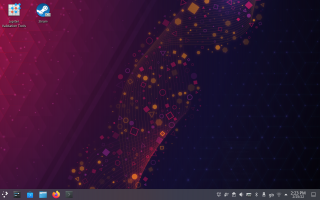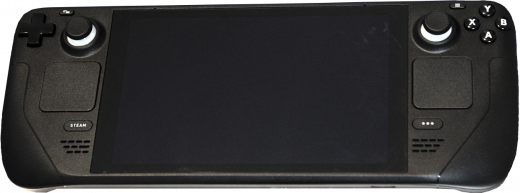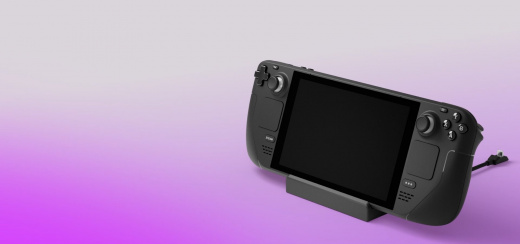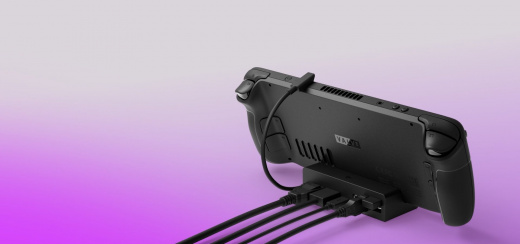The  Steam Deck™ is a handheld gaming computer from Valve that uses SteamOS. It's allows you to play PC games with Linux-based Proton compatibility layer (for Windows games), or Linux games natively. The original model (also referred to as the LCD model), was first released in February 25th, 2022.
Steam Deck™ is a handheld gaming computer from Valve that uses SteamOS. It's allows you to play PC games with Linux-based Proton compatibility layer (for Windows games), or Linux games natively. The original model (also referred to as the LCD model), was first released in February 25th, 2022.
Almost all Valve games (such as Half-Life 2, up to Portal 2) have been updated to natively support all of the Steam Deck's functionality (such as controller layout and bigger menu UI for the small screen) via an update released in 2021-2022 respectively, marking the game compatibility with the Steam Deck as  Verified. Half-Life 2 and Portal comes with entirely new menu UI (Gamepad UI) which makes it scalable on any resolution (including 4K or higher), while also can be easily navigate using a controller, compared to which become smaller if you run the game on higher resolution.
Verified. Half-Life 2 and Portal comes with entirely new menu UI (Gamepad UI) which makes it scalable on any resolution (including 4K or higher), while also can be easily navigate using a controller, compared to which become smaller if you run the game on higher resolution.
There is a expansion for the Steam Deck, the Docking Station, which adds more extensibility to your current gaming setup, allowing you to connect your Steam Deck to your TV, Monitor, etc... up to 1440p@120Hz or 4K@60Hz using the DisplayPort or HDMI, and also allows you to connecting your USB devices and Gigabit Ethernet to your Steam Deck.
An OLED model was announced on November 9th, 2023, which was later released in November 16, 2023. These models replace the previous 2 higher end LCD/original model. Furthermore, a Limited Edition version of Steam Deck OLED, which have a translucent case, was also available alongside with the normal OLED model, through it is only available in US and Canada with limited quantities. The OLED model, by it's name, featured a OLED screen (which have higher contrast ratio and deeper black level compared to LCD), plus better battery life, faster Wi-Fi, better thermal design, and much more.
For more information, visit the Steam Deck page and for the Docking Station, visit this page.

Screenshot of
 Steam Deck
Steam Deck's operating system, SteamOS 3.0, with the default KDE Plasma desktop, running on.
Hardware Specifications
 Warning:The hardware specifications and other information below may be changed over time. Therefore, it is recommended that you visit the official Steam Deck page for the latest information about its hardware specifications.
Warning:The hardware specifications and other information below may be changed over time. Therefore, it is recommended that you visit the official Steam Deck page for the latest information about its hardware specifications.This is the hardware specifications for the Steam Deck. Both original (LCD) and OLED models were included.

Front side of the Steam Deck console.
Original (LCD) model
| Steam Deck original model (LCD) - Tech Specs |
| Compute |
| Processor |
7 nm AMD APU
CPU: Zen 2 4c/8t, 2.4-3.5GHz (up to 448 GFlops FP32)
GPU: 8 RDNA 2 CUs, 1.0-1.6GHz (up to 1.6 TFlops FP32)
APU power: 4-15W |
| RAM |
16 GB LPDDR5 on-board RAM (5500 MT/s quad 32-bit channels) |
| Storage |
Steam Deck 64GB*
Steam Deck 256GB
Steam Deck 512GB*
All include high-speed microSD card slot
*available while supplies last - no longer manufactured |
| Controls and Input |
| Gamepad controls |
    buttons buttons
D-pad
L & R analog triggers
L & R bumpers
View & Menu buttons
4 x assignable grip buttons |
| Thumbsticks |
2 x full-size analog sticks with capacitive touch |
| Haptics |
HD haptics |
| Trackpads |
2 x 32.5mm square trackpads with haptic feedback
55% better latency compared to Steam Controller
Pressure-sensitivity for configurable click strength |
| Gyro |
6-Axis IMU |
| Display |
| Resolution |
1280 x 800 x RGB |
| Type |
Optically bonded IPS LCD for enhanced readability |
| Display size |
7” diagonal |
| Maximum brightness |
400 nits typical |
| Refresh rate |
60Hz |
| Touch enabled |
Yes |
| Sensors |
Ambient light sensor |
| Connectivity |
| Bluetooth |
Bluetooth 5.0 (support for controllers, accessories and audio) |
| Wi-Fi |
Dual-band Wi-Fi radio, 2.4GHz and 5GHz, 2 x 2 MIMO, IEEE 802.11a/b/g/n/ac |
| Audio |
| Channels |
Stereo with embedded DSP for an immersive listening experience |
| Microphones |
Dual microphone array |
| Headphone / mic jack |
3.5mm stereo headphone / headset jack |
| Digital |
Multichannel audio via DisplayPort over USB-C, standard USB-C, or Bluetooth 5.0 |
| Power |
| Input |
45W USB Type-C PD3.0 power supply |
| Battery |
40Whr battery - 2-8 hours of gameplay |
| Expansion |
| microSD |
UHS-I supports SD, SDXC and SDHC |
| External connectivity for controllers & displays |
USB-C with DisplayPort 1.4 Alt-mode support; up to 8K @60Hz or 4K @120Hz, USB 3.2 Gen 2 |
| Size and Weight |
| Size |
298mm x 117mm x 49mm |
| Weight |
Approx. 669 grams |
| Software |
| Operating System |
SteamOS 3 (Arch-based) |
| Desktop |
KDE Plasma |
|
OLED model
| Steam Deck OLED - Tech Specs |
| Compute |
| Processor |
6 nm AMD APU
CPU: Zen 2 4c/8t, 2.4-3.5GHz (up to 448 GFlops FP32)
GPU: 8 RDNA 2 CUs, 1.6GHz (1.6 TFlops FP32)
APU power: 4-15W |
| RAM |
16 GB LPDDR5 on-board RAM (6400 MT/s quad 32-bit channels) |
| Storage |
Steam Deck 512GB/1TB NVMe SSD
Both include high-speed microSD card slot |
| Controls and Input |
| Gamepad controls |
    buttons buttons
D-pad
L & R analog triggers
L & R bumpers
View & Menu buttons
4 x assignable grip buttons |
| Thumbsticks |
2 x full-size analog sticks with capacitive touch |
| Haptics |
HD haptics |
| Trackpads |
2 x 32.5mm square trackpads with haptic feedback
Pressure-sensitivity for configurable click strength |
| Gyro |
6-Axis IMU |
| Display |
| Resolution |
1280 x 800 x RGB |
| Type |
HDR OLED |
| Display size |
7.4” diagonal |
| Maximum brightness |
1,000 nits peak brightness (HDR)
600 nits (SDR) |
| Contrast ratio |
> 1,000,000 : 1 |
| Color gamut |
110% P3 |
| Refresh rate |
up to 90Hz |
| Response time |
<0.1 ms |
| Touch enabled |
High performance touch |
| Sensors |
| Light |
Dual ambient light sensor ALS |
| Connectivity |
| Bluetooth |
Bluetooth 5.3 (support for controllers, accessories and audio)
Dedicated Bluetooth antenna |
| Wi-Fi |
Tri-band Wi-Fi 6E radio, 2.4GHz, 5GHz, and 6GHz 2 x 2 MIMO, IEEE 802.11a/b/g/n/ac/ax |
| Audio |
| Channels |
Stereo with embedded DSP for an immersive listening experience |
| Microphones |
Dual microphone array |
| Headphone / mic jack |
3.5mm stereo headphone / headset jack |
| Digital |
Multichannel audio via DisplayPort over USB-C, standard USB-C, or Bluetooth 5.3 |
| Power |
| Input |
PD3.0 Type C power supply, 45W
2.5m cable |
| Battery |
50Whr battery - 3-12 hours of gameplay |
| Expansion |
| microSD |
UHS-I supports SD, SDXC and SDHC |
| External connectivity for controllers & displays |
Display port over Type C; up to 8K @60Hz or 4K @120Hz, USB3 gen 2 |
| Size and Weight |
| Size |
298mm x 117mm x 49mm |
| Weight |
Approx. 640 grams |
| Software |
| Operating System |
SteamOS 3 (Arch-based) |
| Desktop |
KDE Plasma |
|
Accessories
Docking Station
Expansion

Front side of the Docking Station, with the Steam Deck attached to it.

Front side of the Docking Station, with the Steam Deck attached to it.
Peripherals
3 x USB-A 3.1 Gen1 Ports
Networking
Gigabit Ethernet
External displays
DisplayPort 1.4
HDMI 2.0
Supports up to 4k 60hz, or 1440p 120hz
MST (Multi-Stream Transport) enabling multi-monitor support*
FreeSync support**
 Note:* MST support currently requires both the HDMI and DisplayPort ports to be in use, update is forthcoming.
Note:* MST support currently requires both the HDMI and DisplayPort ports to be in use, update is forthcoming. Note:** FreeSync support is in-progress, update is forthcoming.
Note:** FreeSync support is in-progress, update is forthcoming.See also
- Category of Steam Deck games compatibility:
 SteamOS - Steam Deck operating system.
SteamOS - Steam Deck operating system.- Gamepad UI in mods - tutorials on how to add the Gamepad UI (used when you play Half-Life 2 or Portal on Steam Deck) to your Source mod.
External links
![]() Steam Deck™ is a handheld gaming computer from Valve that uses SteamOS. It's allows you to play PC games with Linux-based Proton compatibility layer (for Windows games), or Linux games natively. The original model (also referred to as the LCD model), was first released in February 25th, 2022.
Steam Deck™ is a handheld gaming computer from Valve that uses SteamOS. It's allows you to play PC games with Linux-based Proton compatibility layer (for Windows games), or Linux games natively. The original model (also referred to as the LCD model), was first released in February 25th, 2022.![]() Verified. Half-Life 2 and Portal comes with entirely new menu UI (Gamepad UI) which makes it scalable on any resolution (including 4K or higher), while also can be easily navigate using a controller, compared to which become smaller if you run the game on higher resolution.
Verified. Half-Life 2 and Portal comes with entirely new menu UI (Gamepad UI) which makes it scalable on any resolution (including 4K or higher), while also can be easily navigate using a controller, compared to which become smaller if you run the game on higher resolution.

 Verified - for Verified games
Verified - for Verified games Playable - for Playable games
Playable - for Playable games Unsupported - for Unsupported games
Unsupported - for Unsupported games Unknown - for Unknown/Not tested games
Unknown - for Unknown/Not tested games SteamOS - Steam Deck operating system.
SteamOS - Steam Deck operating system.


